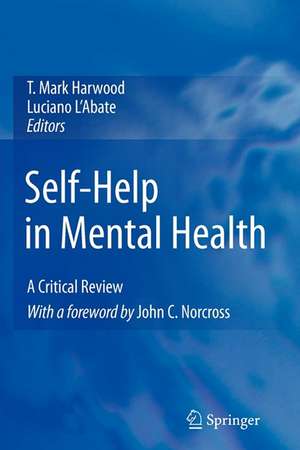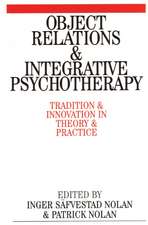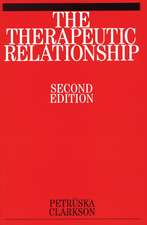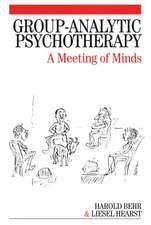Self-Help in Mental Health: A Critical Review
Autor T. Mark Harwood, Luciano L'Abateen Limba Engleză Paperback – 8 noi 2010
| Toate formatele și edițiile | Preț | Express |
|---|---|---|
| Paperback (1) | 717.93 lei 6-8 săpt. | |
| Springer – 8 noi 2010 | 717.93 lei 6-8 săpt. | |
| Hardback (1) | 724.87 lei 6-8 săpt. | |
| Springer – 14 dec 2009 | 724.87 lei 6-8 săpt. |
Preț: 717.93 lei
Preț vechi: 755.72 lei
-5% Nou
Puncte Express: 1077
Preț estimativ în valută:
137.39€ • 143.26$ • 114.19£
137.39€ • 143.26$ • 114.19£
Carte tipărită la comandă
Livrare economică 21 martie-04 aprilie
Preluare comenzi: 021 569.72.76
Specificații
ISBN-13: 9781441981707
ISBN-10: 1441981705
Pagini: 312
Ilustrații: XXIV, 312 p.
Dimensiuni: 155 x 235 x 18 mm
Greutate: 0.47 kg
Ediția:2010
Editura: Springer
Colecția Springer
Locul publicării:New York, NY, United States
ISBN-10: 1441981705
Pagini: 312
Ilustrații: XXIV, 312 p.
Dimensiuni: 155 x 235 x 18 mm
Greutate: 0.47 kg
Ediția:2010
Editura: Springer
Colecția Springer
Locul publicării:New York, NY, United States
Public țintă
ResearchCuprins
to the Field of Self-help in Mental Health.- What Constitutes Self-Help in Mental Health and What Can Be Done to Improve It?.- The Self-Help Movement in Mental Health: From Passivity to Interactivity.- Self-Support Methods: Initiated, Administered, Guided, Maintained, and Monitored by Professionals.- Distance Writing: Helping without Seeing Participants.- Bibliotherapy.- Online Support Groups and Therapy.- Manuals for Practitioners.- Self-help and Self-change Approaches for Specific Conditions Initiated, Administered, Guided, Maintained, and Monitored by Professionals.- Anxiety Disorders.- Mood Disorders.- Eating Disorders: Anorexia, Bulimia, and Obesity.- Addictive Behaviors.- Personality Disorders.- Severe Psychopathology.- Medical Conditions.- Conclusions and Prospects.- Who Benefits by Self-Help and Why?.
Recenzii
"Harwood and L’Abate’s Self-Help in Mental Health is an information-packed reference volume for the mental health practitioner that provides a wealth of material on self-help resources and the research-based strengths and weaknesses of each as applied to just about all of the common mental health diagnoses, with a few of the more common medicaldiagnoses thrown in. As a bonus, the authors develop a theory of relational competence forself-help, along with 16 models...Self-Help in Mental Health provides bibliotherapy sources, manualized treatments, support group formats, and Internet/website links to assist the practitioner in offering guided self-help to consumers. It is a quality reference..."
- Robert A. Bischoff, PsycCRITIQUES, July 28, 2010, Vol. 55, Release 30, Article 7
- Robert A. Bischoff, PsycCRITIQUES, July 28, 2010, Vol. 55, Release 30, Article 7
Textul de pe ultima copertă
They’re fast, cheap, and promise amazing results—no wonder more people seek mental health advice from self-help books and sites rather than seeking therapy. Complicating this picture: many resources are inappropriate, ineffective, even dangerous. For the clinicians who would gladly recommend self-help for their clients, the challenge is finding reliable, evidence-based sources of help among the vast quantities available.
Self-Help in Mental Health: A Critical Review guides readers through this plethora of materials, organizing it into useful order, evaluating popular approaches and trends, and recommending clinically valid, science-based resources for specific clinical and sub-clinical problems. Its authors explain how and why such methods work, offering innovative uses for self-help in prevention and promotion, therapy and rehabilitation, including strengthening therapeutic gains (akin to homework in cognitive-behavioral therapy) and encouraging self-reliance. While some may be tempted to write-off all self-help as quackery or therapy-lite, Harwood and L'Abate recognize the potential the self-help movement holds for countering the stigma associated with mental health treatments. Further, self-help resources represent a viable means of reaching under-served populations, and, for some individuals, they are preferable to conventional therapy.
Included in the coverage:
Self-Help in Mental Health: A Critical Review guides readers through this plethora of materials, organizing it into useful order, evaluating popular approaches and trends, and recommending clinically valid, science-based resources for specific clinical and sub-clinical problems. Its authors explain how and why such methods work, offering innovative uses for self-help in prevention and promotion, therapy and rehabilitation, including strengthening therapeutic gains (akin to homework in cognitive-behavioral therapy) and encouraging self-reliance. While some may be tempted to write-off all self-help as quackery or therapy-lite, Harwood and L'Abate recognize the potential the self-help movement holds for countering the stigma associated with mental health treatments. Further, self-help resources represent a viable means of reaching under-served populations, and, for some individuals, they are preferable to conventional therapy.
Included in the coverage:
- Recommendations for books, web sites, organizations, support groups, hotlines, and audio-visual materials
- Depression, anxiety, eating disorders, addictions, and other conditions.
- Guidelines for evaluating self-help and guided self-support materials.
- Strategies for integrating self-help with traditional modes of therapy.
- Assessment tools for determining client appropriateness for self-help.
- New directions in theories of self-help andself-change.
- Contraindications for self-help approaches.
Caracteristici
Guidelines for evaluating self-help Strategies for integrating self-help New directions in theories of self-help Includes supplementary material: sn.pub/extras

















